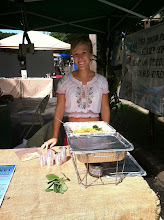One feeling that just might top the
excitement of shaking the hand of your farmer when buying fresh vegetables is
finding them yourself in the wild. By now most of us know that mushrooms,
dandelion greens, and blackberries can be safely foraged from forests. However,
it wasn’t until I found myself bent over in an Italian olive grove that I knew
asparagus is also a wild edible treat.
A recent trip to Puglia in Southern
Italy showed me just how good the slender stalks could be. My relatives knew I was more interested in
the food than a stroll through the piazza
and happily gave me a tour of their gardens as we feasted on freshly baked
focaccia, a Pugliese specialty. I
kept my eyes peeled for my favorite spring treat- asparagus- which I knew would
be somewhere in the mix of fava beans, chicory and cactus pears of April.
Although far from disappointed by the array of nutrition and vegetables flourishing
on their small farm, I still couldn’t locate any asparagus. Upon inquiry I was
shoved frantically in the FIAT and given a mischievous look that had me
thinking I was either in trouble or in for a ride. You never really know with
those fiery Italians from Bari.
Five minutes down the windy road we
stopped short in an abandoned olive grove. Puglia is home to the dry, flat
scenery in many old school spaghetti westerns. It looked barren, dry, and
robbed of greenery. I wanted asparagus, not olives. Besides I knew by now that
olives can’t be eaten until treated. Somewhat impatient and extremely confused,
my boyfriend’s Aunt dragged me into the groves.
One by one she snapped tiny little
stalks of asparagus from amidst the overgrown brush. It was like looking for
chameleons. The grass was so tall and all of the foliage was the same color.
How could I spot one? After unsuccessfully harvesting some blades of grass and
a few weeds, suddenly eccolo! My
first stalk! A few minutes later our pockets and shirts were overflowing with dark
green spears. After yesterday’s lunch of fava bean stew, I couldn’t wait to see
what my relatives would do with the asparagus. Simplicity is their luxury when
it comes to food.
I waited patiently at the table,
offering my help though continuously refused. I figured watch the masters at
work and take notes. A half hour later one of the most simple and delicious
Italian classics had the misfortune of landing on my plate. Fluffy, fresh and
the brightest color yellow, the homemade asparagus frittata is what I wrote
home about. Drizzled with some quality olive oil and paired with dense homemade
bread, frittata should never be limited to just breakfast.
Although we may not be able to
forage for wild asparagus in 500-year-old olive groves here on Long Island, we
can still take advantage of asparagus by making frittata. Asparagus can only be harvested for 6-7 weeks of the year
and takes at least 3 years of root development before it can be picked. Free of
fat, cholesterol, and low in sodium, you better get it while its hot because
soon after harvesting the spears grow into large ferns with red berries that
ensure the plant’s health and succession for the next season. A well cared for
plant can produce for up to 15 years. Try this simple frittata recipe with farm-fresh local eggs, asparagus, and herbs at
the Kings Park Farmers Market. If you’re up for the adventure you can find
ramps (wild leeks) in local forests to make up for buying asparagus at the
farmer’s market. Make sure to consult a field guide or expert before eating! Bon apetito!
Frittata d’asparago
(Asparagus Frittata):
Adapted from recipe by Michael Lomonaco
Ingredients:
-
12 large farm fresh eggs, shelled and beaten
-
½ cup organic milk
-
¼ cup freshly grated Parmesean cheese
-
2 tablespoons extra-virgin olive oil
-
2 tablespoons butter
-
1 small bunch of ramps, chopped
-
½ of a medium sized onion, diced
-
½ pound asparagus, blanched, chilled, and diced
-
¼ cup of assorted fresh herbs: thyme, chives,
chervil, etc.
-
salt and pepper
Preparation:
Preheat oven to 325 degrees F. In a large bowl, combine the eggs, milk and parmesans. Heat the butter and oil in a large pan. Add
the onion and cook until translucent and golden. Using a large spatula, stir in
the eggs and turn heat down to low. Stir the edges to form a large, flat omelet
shape. Make sure the bottom of the pan is covered in the egg mixture. When the egg begins to cook and take shape,
sprinkle in the diced asparagus and herbs. Place the whole pan in the oven and
continue to cook for 2 more minutes until the edges have cooked and the center
has puffed up. Remove immediately from the
oven, invert on a large plate, garnish with salt, pepper and more herbs and
serve immediately.

No comments:
Post a Comment